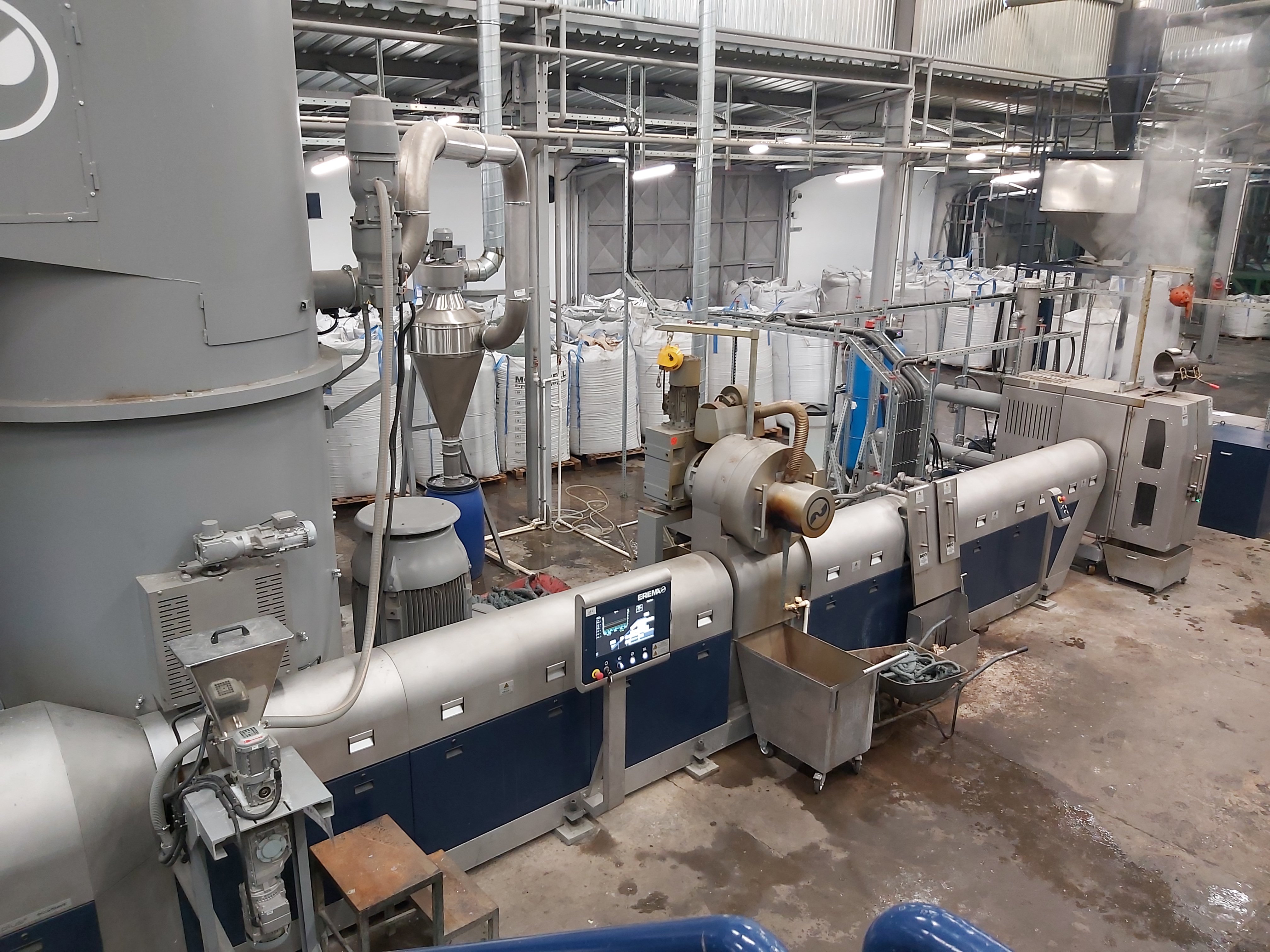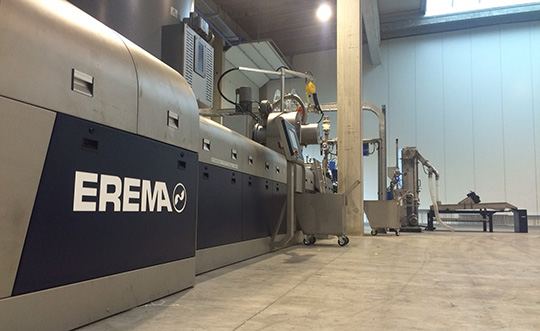46 million tonnes of plastic are in circulation every year in Europe. The European recycling business produces 2.3 million tonnes of recyclate – which means that just 5 per cent of the consumers' plastic is reprocessed. Cedo and EREMA see quality assurance in recyclates and increased public awareness as decisive factors for a closed loop for plastics in Europe.
The 49 employees at Cedo Recycling located in the Dutch city Sittard-Geleen produce around 30,000 tonnes of plastics recyclate every year. Besides agricultural films the subsidiary of the Cedo Group also processes DSD 310 with the new INTAREMA technology. Cedo Recycling produces around 1,050 kg of recyclate per hour in the new INTAREMA 1512 TVEplus with Laserfilter and homogenisation package. The plastic recyclates which are produced are all shipped to Cedo Great Britain to make film products again such as bin bags.
Recycling DSD 310 – an underestimated raw material source
The recycling of DSD 310 – plastic film from the post-consumer household sector – is still a challenge for recyclers, emphasises Ton Emans. Nevertheless, when Cedo was acquired by Straco in 2014 the new shareholder made a conscious decision together with Ton Emans to invest in the recycling of post-consumer household waste. "Due to its many barrier layers of PET and PA and the high organic contamination, DSD 310 – film packaging for food – is very difficult to recycle. The thermal utilisation of DSD 310 which has been common until now was, in my eyes, not in the sense of the circular economy. I was convinced that you can reuse the raw material at a profit and in an environment-friendly way." Ton Emans got EREMA involved for their support in the recycling process and developed the appropriate recycling method with the Austrian technology leader. An INTAREMA 1512 TVEplus was customised especially to meet these requirements. "It was by no means easy to process such a difficult material to make high-quality recyclates. The technical development required a special add-on for the INTAREMA system – the double filtration homogenisation package – as the complex contaminants have to be removed step by step. Months of trials resulted in the desired recyclate quality," says Clemens Kitzberger, Business Development Manager for Post Consumer Recycling at EREMA. Thanks to Counter Current technology the benefits of the preconditioning unit can be implemented even better and with greater stability. In combination with the EREMA Airflush technology anything which adheres to the film - such as moisture, organic contaminants or printing inks - can already be degassed before the extruder. The already degassed and thoroughly warmed input material then goes into the extruder screw where the polyethylene is melted with minimal mechanical stress. Polymers with a high melt temperature such as PET, PA or PA and also solid matter such as aluminium or wood are untouched and can be separated and removed using a Laserfilter with 90µm screens.
The material then goes into the new extruder-screw mixer (developed for this material) in the TVEPlus zone in which homogenisation takes place. The homogeneous melt is heated to degassing temperature. The double degassing is followed by the second filtration by means of the SW RTF, the EREMA backflush filter. This filters minimal, rubber-like residual particles through its large filter area and with coarse 200µm screens at an extremely low pressure level – the high screeservice life means a considerable saving in costs. The result is recyclates with the best possible degassing and filtration for the blown film industry. "Thanks to the close collaboration with Cedo we have been able to develop the homogenisation package with the double filtration for this application-specific adaptation of the system so it is ready for series production. The best praise for us is that Cedo has placed an order for two more INTAREMA systems," says a delighted Clemens Kitzberger.
Proven recyclate quality as a lever for the circular economy
According to EREMA CEO Manfred Hackl, recycling is becoming an increasingly important part of the plastics industry. "Since the K show at the end of October – if not before – it can be said that recycling has an unrivalled, high standing in the plastics sector – and this is an upward trend. As we see it, our role as global market leader also includes our driving forward the topic of recycling and drawing people's attention to the opportunities and possibilities through quality recyclates," says Manfred Hackl, describing EREMA's mission. The objective has to be that the entire plastics industry thinks and acts in an integrated way to create a positive image – as already demonstrated with success by the paper, glass and metal industry. "This is why we are delighted about customers and, in the case of Cedo Recycling, partners who also tackle difficult material and want to make the best use of plastic as a resource." EREMA presented the first smart factory package in the plastics recycling industry at the K trade fair this year and it met with great approval among recyclers and converters. CAREFORMANCE is designed to measure and analyse machine, production and quality data live and interconnect production and recycling plants. With an MES system such as Erema's re360, companies like Cedo which operate on an international scale can keep track of all their machines around the world in real time. "We were led by two requirements in our development work: increasing the productivity of our customers and driving forward quality recycling. This opens up new business opportunities for our customers and is a significant step in the realisation of the circular economy," continues Manfred Hackl. With QualityOn, the direct online measuring of colour and MVR during production, immediate recyclate quality documentation is possible for the first time. The recycler can present the client the property profiles of the recyclates at the push of a button. Now there is no reason why we there should be no European standards in plastics recycling.
| Application: | Post-consumer recycling |
|---|---|
| Materials: | PE washed film flakes (e.g. DSD310) |
| Product category: | INTAREMA |
| Modell Details: | INTAREMA 1512 TVEplus mitLaserfilter und Homogenisierungspaket |

Serbian company recycles film from collected from household waste to produce new film for the construction industry
"The quality is simply perfect!". That is how Dejan Simic, owner of the Serbian plastic waste processor Brzn Plast d.o.o., assesses the recycled pellets produced by his company since July 2022 using the new INTAREMA® TVEplus® technology from EREMA.

TIVACO, Belgium
The Belgian company TIVACO recycles post-industrial scraps in polypropylene, polyethylene, polystyrene and flexible PVC to make recycled pellets for the production of high-end products such as visible automotive parts or household articles ...